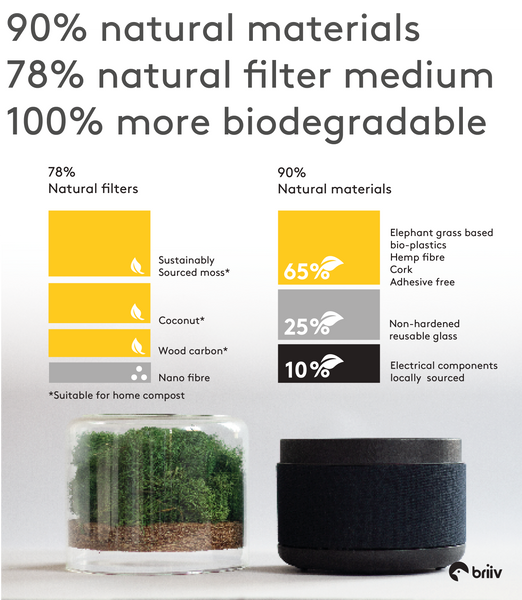Technology
Watch Briiv In Action

Moss - Natural dried moss captures large particulate matter like dust and animal dander from the air and can biodegrade in your home compost.
Coconut - The coconut husk filter traps harmful substances from the air and is compostable, and provides a good addition to soil!
Combination Nano Matrix - A newly engineered bespoke filter which combines both the elements of:
Carbon - Activated charcoal from waste walnut husks which pulls odours from the air, so Briiv not only filters the air, it smells better too.
Nanofibers - Briiv’s secret weapon. Developed originally for the medical industry, these cutting edge filters remove the finest harmful particles from the air.
The Science

Our filters, using a nanoscale mesh, capture much finer particles with increased efficiency and are manufactured in state of the art facilities.
Briiv Efficiency

Briiv will improve the air quality in a 36m² (387ft²) living space in just one hour, with a delivery of 53 cubic feet per min of purified clean air.
Continual flow tests have been carried out on Briiv under normal and high load conditions, under EN 1822-4 conditions.
Overall performance showed a 78% improvement in air quality in one pass under low load, and 80% under high load conditions.
The full test reports can be found here.
Low Power

Rethinking plastic

Instead of opting for oil-based plastics, Briiv uses a new bio-plastic derived from elephant grass which is grown where agricultural crops can't be. This crop captures carbon in the process and fully biodegrades.
This is seen as far superior to recycling as standard plastics can only be reused a few times before so they have to be put to landfill.
Using a biodegradable material is the best option for our environment.

Every component of Briiv has been meticulously considered. Parts that are not biodegradable, such as the glass, can be easily recycled. This leaves only the electrical components and the small nano matrix filter. We hope to be able to replace these in the future with more sustainable alternatives when technology allows us to do so in a safe way.
